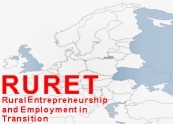
Every effort will be made to distribute the results of this research as
widely as possible. In particular, the project will result in the publication
of:
-
an annual report monitoring the progress of the research in month 12, and a Final Report directly addressing the six objectives of the research in month 24.
-
a book which details the main theoretical contributions and the key empirical findings and policy conclusions of the project will be published. There are a variety of reputable commercial publishing houses interested in the project. This project will target both academic and policy-related audiences.
-
a series of academic articles in national and international journals will be generated from the results of the project. They will aim mainly at an academic audience.
-
Working Papers, produced in English as well as Russian, Ukrainian and Romanian, will be used as a means of disseminating the results to policy-makers. It is anticipated that Working Papers will contribute in strengthening the Collaboration with Policy-makers Approach.
-
a Gopher will be created in order to further facilitate the dissemination of the results of the proposed project. In the first instance Working Papers and a harmonised database will be located on the University of Macedonia WEB site in a format which will allow for immediate electronic access, subject to Data Protection and confidentiality constraints.
The database will also be a valuable source of processed information that can support policy-makers at the national and international level, and researchers in the years to come.
DISSEMINATION OF RESULTS II
The communication of results will be attained via a range of media and dissemination formats, apart from the scientific publications described before. That is:
-
An International Conference will be organised at the end of the project. This will include in addition to the research consortium, experts on the topic, key representatives from the various governmental levels of each of the participating countries and from INTAS.
-
the results of this research will be disseminated by each team in their respective country through public lectures, presentations and direct communication with the relevant ministries;
-
all members of the research consortium will be available to brief staff of INTAS and other international organisations on the results of the study requested;
-
since all of the key members of the research teams are academics working in Universities, the use of the material of the project in lectures will be strongly encouraged;
-
individual members of the research teams will also be encouraged to submit short articles in relative newspapers in the areas under investigation so as to increase awareness about the project, its aims and objectives and key findings.